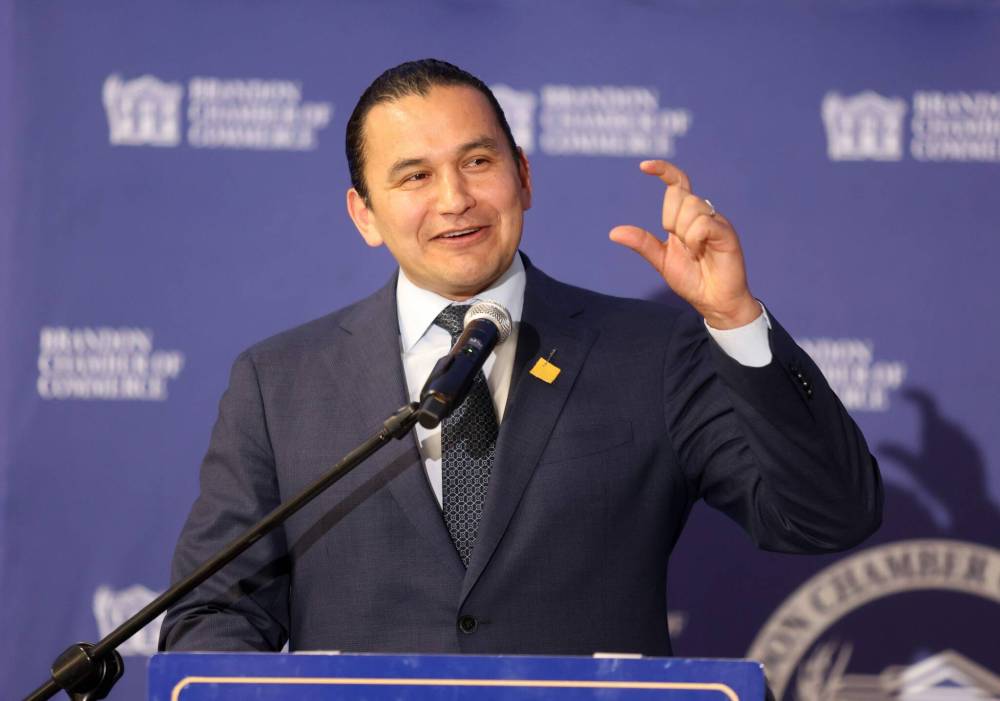Manitoba MLAs wrapped up the spring sitting of the legislature this week. It’s a good time to take stock of what the new NDP government has accomplished and what it has failed to achieve since winning last fall’s election.
The NDP introduced more than 20 bills, including new legislation that would address sexual violence at universities, create safe zones around abortion clinics and ban replacement workers during labour disputes. Most of those bills received royal assent this week, while four were delayed by the Opposition Tories until the fall, as per house rules.
Some are contained in government’s budget implementation omnibus bill, which means they cannot be scrutinized at public hearings the way most proposed legislation can (an undemocratic feature of Manitoba’s legislative process both the NDP and Progressive Conservative party are guilty of using while in government).

Matt Goerzen / Brandon Sun files
Premier Wab Kinew
At least one private member’s bill passed by the legislative assembly — to recognize the rights of transgender, two-spirit and non-binary people — exposed an ugly element within the PC party, where four of its MLAs voted against the bill.
While the NDP government did make good on some of its election promises — including cutting the provincial fuel tax, making Louis Riel Manitoba’s honorary first premier and taking steps to replace Manitobans’ paper health cards with plastic ones — it failed to make progress on its biggest pledge to voters last fall: to fix the province’s broken health-care system.
During the NDP’s first seven months in office, wait times for surgeries such as hip and knee replacement continued to grow. Emergency room wait times are still on the rise, driven mostly by overcrowded hospitals and a severe shortage of staffed hospital beds. Despite grand pronouncements of hiring hundreds of nurses, doctors and other front-line health care professionals to address Manitoba’s understaffed health-care system, there is no evidence such progress has been made.
It would be unreasonable and unfair to expect any new government to “fix” health-care overnight. It is a complex and difficult system to manage and requires significant resources and months of comprehensive planning to improve. The NDP inherited a health-care system that is not able to meet the growing demand for medical services. It will take considerable effort and strategic planning to turn that around.
Still, that is the government’s job. The NDP made a solemn pledge to voters last year to significantly improve health care outcomes, a commitment that helped propel it to electoral victory. It was by far the single biggest election promise made by the NDP.
Yet after nearly seven months in office and almost a full legislative session under its belt, the NDP has made very little — if any — progress on health care.
There have been many announcements about plans to hire more front-line staff, but no data showing a net increase in personnel. By most measurements, the state of Manitoba’s health-care system is worse today than it was when the NDP won office in October 2023.
Premier Wab Kinew and his government will have the opportunity this summer and fall, when the legislative assembly resumes sitting, to show Manitobans they were not peddling empty promises when they vowed last year to fix the province’s beleaguered health-care system.
To do so, they must improve how hospitals, personal care homes and home care are managed. Improvements cannot be made in health care without a net increase in front-line health care workers, something the government should measure and make available publicly.
Fixing health care is the top priority of Manitobans. It’s high time the NDP government started demonstrating it has a plan to make significant inroads in that area.





